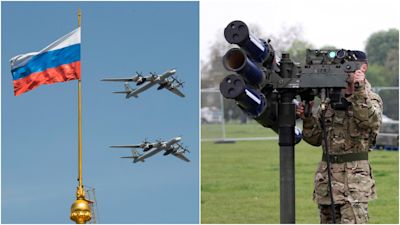UK sends Ukraine more weapons as Sturgeon says Nato should consider no-fly zone

US Correspondent Emma Murphy reports on the no-fly zone and the challenge it presents to Nato's unity
Nicola Sturgeon has said Nato should be considering whether to implement a no-fly zone over Ukraine, despite the threat of retaliation from Russia which many believe could lead to a new world war.
Scotland's first minister said she "shares concerns" about what could happen if Nato enforced a no-fly zone by shooting down Russian planes, but said the move should be considered on a "day to day basis".
But Foreign Secretary Liz Truss said "setting up a no-fly zone would lead to a direct confrontation between Nato and Russia and that is not what we're looking at".
"What we're looking at is making sure that the Ukrainians are able to defend their open country with the best possible selection of anti-tank weapons and anti-air defence systems."
She condemned the "absolutely abhorrent, reckless and appalling" aerial bombing of a maternity hospital but again ruled out a no-fly zone while holding a joint press conference with US secretary of state Anthony Blinken in Washington.
She said "the best way to help protect the skies is through anti-air weaponry," which UK is supplying.
The Pentagon also rejected Poland's surprise announcement that it would give the United States its MiG-29 fighter jets for use by Ukraine, after the move was called "high-risk".
Pentagon spokesman John Kirby said Poland's declaration that it intended to deliver the 28 jets to the US Ramstein Air Base in Germany raised the concerning prospect of warplanes departing from a US and NATO base to fly into airspace contested with Russia in the Ukraine conflict.
The UK and Nato leaders have repeatedly ruled out a no-fly-zone, with Defence Secretary Ben Wallace telling MPs on Wednesday that it would benefit the Russians.
"If you had a no-fly zone, the Russians have a massive advantage with shells and missiles and they would not stop in a no-fly zone whereas the few things that the Ukrainians have to reach the Russians at depth are in the air and I think you'd actually hamper one."
Mr Wallace said the UK had already delivered 3,615 anti-tank weapons - known as NLAWs - to Ukraine, and will shortly be supplying a "small consignment" of Javelin anti-tank missiles.
Defence Secretary Wallace said "in response to a Ukrainian request, the government has taken the decision to explore the donation of Starstreak high-velocity manned portable anti-air missiles.
"We believe that this system will remain within the definition of defensive weapons but will allow the Ukrainian force to better defend their skies."
NLAWs - made by the Swedish company Saab - have a range of up to 600 metres, it is a portable, shoulder-mounted missile system weighing just 12.5 kilograms.
The British Army says the missile can destroy "any main battle tank in just one shot by striking it from above".
The Starstreak weapon being considered is a short range man-portable anti-aircraft defence system.
Travelling at more than three times the speed of sound, according to the British Army, it can be shoulder-mounted or attached to a vehicle.
The Ministry of Defence declined to elaborate on plans to supply Ukraine with Starstreak.
It comes following pleas from President Volodymyr Zelenskyy, who urged MPs in a Commons address on Tuesday to protect Ukrainian skies.
"Please make sure that our Ukrainian skies are safe," he said, "Please make sure that you do what needs to be done and what is stipulated by the greatness of your country."
Thousands of people have already been killed on both sides amid Russia's war with Ukraine and millions of Ukrainians have fled the country.
The Ministry of Defence said its latest intelligence suggested Ukrainian cities were continuing to suffer heavy shelling but Vladimir Putin’s assault on Kyiv had failed to make major progress.
"Fighting north-west of Kyiv remains ongoing with Russian forces failing to make any significant breakthroughs," the MoD said.
"The cities of Kharkiv, Chernihiv, Sumy and Mariupol remain encircled by Russian forces and continue to suffer heavy Russian shelling.
"Ukrainian air defences appear to have enjoyed considerable success against Russia’s modern combat aircraft, probably preventing them achieving any degree of control of the air."